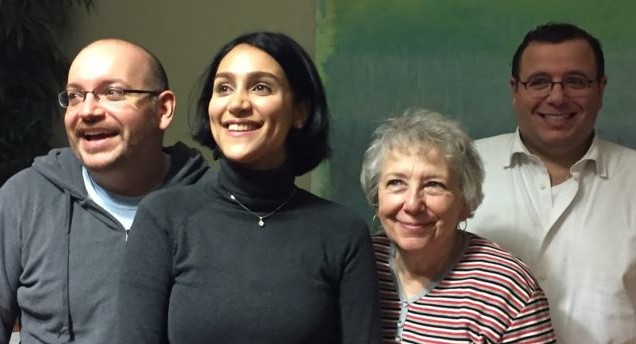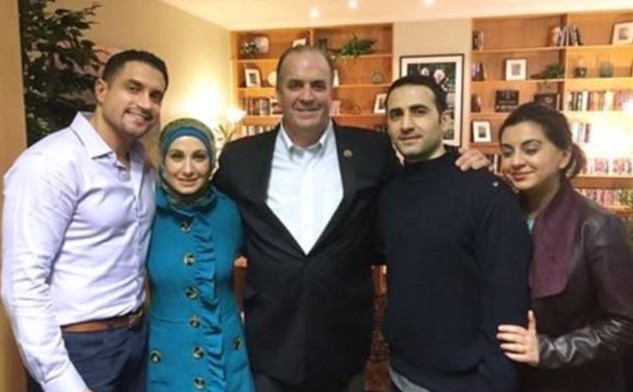January 22-2016

The Islamic Republic has freed most but not all of the Americans detained in Iran. But the release was held up twice from Saturday afternoon to Sunday morning as multiple Iranian officials refused to allow Jason Rezaian’s wife and mother to get on the plane and fly out of the country with Rezaian.
The Swiss government, which helped arrange the release of the American prisoners and sent a government plane to pick them up—refused an Iranian command to fly off with the three men and without the two women. The Swiss government said the agreement specifically called for the two women to leave on their plane.

Rezaian’s mother, Mary, is an American-born woman with no links to Iran other than her late husband, who was a dual Iranian-American citizen. Rezaian’s wife, Yeganeh Salehi, is an Iranian citizen with no legal connection to the United States. Jason was trying to arrange for her to get a US green card when he was jailed.
The Swiss contacted the United States about the problem and US Secretary of State John Kerry yet again got on the telephone to Iranian Foreign Minister Mohammad-Javad Zarif.
Zarif learned the two women were confined to a hotel, though it still is not clear what Iranian official or agency was keeping them confined. Zarif got them sprung and sent to the airport. But once at the airport, someone there refused to allow them on the plane. That individual has not been identified either.
Zarif was called again and found someone who was able to break that logjam.
In the meantime, the crew of the Swiss government plane had been on duty too long and was required to take a break. The Swiss sent another plane out to Tehran to take over and fly the Americans out the next day.
Three of the freed dual nationals—Jason Rezaian, Amir Hekmati and Saeed Abedini—are all well known. They were flown together to Germany where they are expected to remain for several days undergoing medical checks and interviews.
The fourth person freed was Matthew Trevithick, 30, who had only been detained for about 40 days and flew straight home to Boston when he was freed. Trevithick had gone to Tehran to study Farsi for four months, one of a half-dozen people in a program the United States sponsored. It isn’t known why he was arrested—or if the language program will survive his detention.
His stepfather said Matthew was very careful to stick to his studies and not to do anything suspicious. The stepfather said Matthew assumed he was followed everywhere.
The last person freed was dual national Nosratollah Khosravi. Nothing is known about him. It wasn’t known why he was arrested or when. Reporters checking Facebook and other social media could find no sign of him. What’s more, US officials he chose to remain in Iran after he was released.
A bigger issue is the three who were not freed.
Siamak Namazi, 44, was born in Iran, reared in the United States and returned to Iran after college, where he worked for years for a group helping foreign firms invest in Iran. He had some problems with the government and moved to the UAE a few years ago. He was visiting Tehran a few months back when he was arrested. He was not among those freed and no one in either the United States or Iran has provided an explanation for that.
Hamid Ghassemi is a dual national whose home is in Louisiana. His father stands accused of hiring two men to kill his mother. Hamid flew to Iran with his mother’s body to arrange her burial there last summer. Friends heard from him at one point that he had been arrested in June. He was not among those released last weekend, and there has been no word about him. It is possible he was freed earlier, but there have been no news reports from Louisiana about his returning there.
Robert Levinson was last seen in the custody of Iranian police on Kish Island in 2007, although Iran has denied ever detaining him. In 2011, someone sent his family an email with photos showing him heavily bearded and in an orange jumpsuit holding signs appealing for help. That appeared to be effort to promote some ransom. But no further contact has been made with the family. The family is very angry with the Obama Administration for not winning his release. White House spokesman Josh Earnest said Tuesday that US officials “have reason to believe that he is no longer in Iran.” Other officials said Levinson was believed to be dead—which would mean he was no longer in Iran. He would now be 67 if he were till alive. Kerry was asked if Levinson was alive or dead and responded: “We have no idea.” But the bottom line was that Iran consistently said it couldn’t free him and to continue demanding that Levinson be freed would have meant leaving the others in cells in Evin Prison.
To win the release of the five men, the United States freed from federal prisons six Iranian-Americans and one Iranian national. US officials told reporters that none of the Iranian-Americans agreed to return to Iran—a clear blow to the Islamic Republic. They all went to their homes in the United States. Their refusal to go to Iran underscored what many officials said—they had broken the sanctions laws for personal gain, not out of ideological support for the Islamic Republic.
The one Iranian freed, Nima Golestani, 30, swiftly flew back to Iran. Golestani had been living in Turkey when the United States found him and Turkey agreed to extradite him. He pleaded guilty last month to hacking the computers at a Vermont software company and was awaiting sentencing when he was freed. His entire time living in the United States has been spent in jail.
The other six were convicted of sanctions violations. None of them was ever accused of terrorism, as some of the GOP presidential candidates asserted. Five were accused of helping Iran get its hands on militarily-related equipment, though not necessarily having anything to do with Iran’s nuclear program. They are Bahram Mechanic, Khosrow Afghahi, Arash Qahreman, Touraj Faridi, Ali Sabounchi and Nader Modanlo.
The last of the group, Nader Modanlo, is a Marylander convicted of taking $10 million from Iran to arrange for the launch by Russia of a satellite built by Russia and paid for by Iran. That violated the ban on financial transactions with Iran.
There are still at least six other Iranian-Americans in prison for sanctions violations, according to a survey of records by Reuters. Three of them—Hamid-Reza Hashemi, Amir-Abbas Tamimi and Vahid Hosseini—will complete their terms within another 10 weeks and were presumably excluded because of the short time remaining.
But Reza Olangian is still awaiting trial for trying to buy Russian anti-aircraft missiles to send to Iran. Majid Iranpour Mobarekeh was convicted of sending shell casings to Iran—but also convicted on drug charges, which likely excluded him. And Mozaffar Khazaee was recently convicted of trying to send to Iran a vast quantity of engineering material about the jet engine for the F-35, the most advanced fighter jet in the world.
There are dozens of other Iranians doing prison time, mainly for drug offenses, but also for murder and rape—and one for cutting off a man’s penis. Many are in state prisons and thus beyond the ability of Obama to free them.
There are also dozens of others who have been convicted over the years of sanctions offenses. But many of those are not Iranians. And many have already completed their prison terms and been released.
US officials said Iran initially sought freedom for all Iranian prisoners in the United States, but the United States refused to consider those convicted of violent crimes or drug offenses.
Because the releases came just as the nuclear agreement took effect, many people assumed there was a link. But Kerry said that was wrong. He reiterated what he had said for more than a year—that the men held prisoner were never discussed in the nuclear talks—which after all involved five other countries—but were routinely taken up when Iranian and American officials got together after the seven-nation nuclear talks recessed each day. Separately, Brett McGurk, who handled Iran issues at the State Department, kept working in a second channel for the prisoner releases. Kerry said he thought everything had been worked out last November and the men would be freed in days. But there were further delays until last week.
He said the plan to punish 11 individuals and businesses involved in Iran’s missile program was pulled in December when Foreign Minister Mohammad-Javad Zarif said such an American announcement would squelch the prisoner exchange. The new sanctions were then announced just hours after the prisoners were freed.
Charges were dropped against another 14 Iranians accused of sanctions violations. Those 14 were all living abroad. The United States was seeking to extradite them, but officials said the chances of extraditing them were considered small, so the government was willing to add them to the list.
In Tehran, Foreign Ministry spokesman Hossein Jaberi-Ansari said charges were dropped against another seven Iranians. He did not name them or say where they were.
The United States said noting about any third category covered by the agreement. So the United States said Iran won freedom for 21 people and Iran said it won freedom for 28.
Iran said the 14 the United States will no longer seek to extradite are: Saeed Jamili; Jalal Salami; Matin Sadeqi; Alireza Moazaami Gudarzi; Mohammad Abbas Mohammadi; Korush Taherkhani; Sajjad Farhadi; Ahmad Abtahi; Gholam-Reza Mahmudi; Hamid Arabnejad; Ali Moattar; Mohammad-Ali Sherbaf; Amin Ravan; and Behruz Dolatzadeh.
Meanwhile, three Americans were kidnaped in Baghdad a few days before the releases in Tehran. One was Iraqi-American, one Egyptian-American and one an unhyphenated American. US officials said they were kidnaped by an Iranian-backed militia group but there was no indication they were kidnaped as “replacement hostages” for those released.
